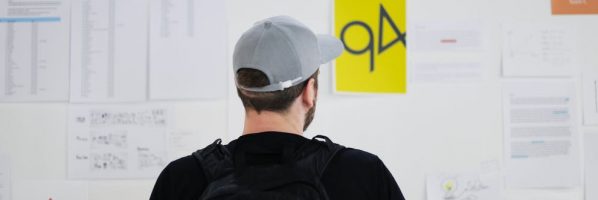Are Companies Getting Big Data Wrong? – New York News

Let’s explore some of the most interesting stories that have emerged from New York business schools this week.
Columbia Business School Researchers Argue Future of Big Data Lies in Its Ability to Assess Consumers’ Mindset in Real Time – Columbia Business School News
Columbia Business School professors Sandra Matz and Oded Netzer recently published a new discussion paper in the Current Opinion in Behavioral Sciences in which they “address the challenges and opportunities of using big data to benefit both business and consumers based on psychological profiles drawn from information posted on personal websites and discussion forums, and language used on Facebook and Twitter.”
Netzer writes, “Big data usage is quickly evolving. With technological advances in the collection, storage and analysis of large amounts of data, businesses can now gain valid insights on millions of consumers as they go about their daily lives.”
Matz adds, “One benefit of psychological profiling is that the pre-selection of ads based on psychological needs can alleviate the problem of choice overload. It can even help target highly neurotic individuals who display early signs of depression with ads that guide them to self-help pages or offer professional advice.”
You can read the full article here.
When Students Come First – BizEd
According to the National Center for Education Statistics, upwards of 30 percent of freshman in higher-education in the United States are the first members of their family to do so. However, there is also a direct correlation to dropout rates: first-gen students have a dropout rate that is four times that of non-first generation students. The research also found that only 11 percent of the first-gen students manage to secure a Bachelor’s degree within six years.
The statistics find that the reason for the dropout rates has less to do with personal decisions, and more with the “lack the financial, social, and emotional support they need to navigate college successfully,” says BizEd writer Tricia Bisoux. Several schools, including the Rutgers Business School in Newark and New Brunswick, have altered the way they approach its first generation students.
“At Rutgers Business School (RBS) at Rutgers University in New Jersey, the key to supporting first-generation students is a suite of programs called RBS-PLUS (Pathways Leading to Undergraduate Success), launched in 2013. Delivered through the business school’s office of diversity, RBS-PLUS doesn’t just support its current first-generation and low-income undergraduates. It also reaches out to high school students to offer guidance just as they’re beginning their college preparation.”
You can find out more about the program here.
Facebook Is an ‘Extraordinary Failure in Leadership,’ NYU’s Galloway Says – Bloomberg
NYU Stern Marketing Professor Scott Galloway recently stopped by the Bloomberg television studios to talk about the ever-tumultuous Facebook galaxy, dishing out some heavy criticism of Mark Zuckerberg and the tech-giant company as a whole. Watch his interview with the Bloomberg panel here.
Columbia Research Identifies Customers At Risk, and More – New York City News

Let’s explore some of the most interesting stories that have emerged from New York business schools this week.
Online Companies Beware: New Columbia Business School Research Reveals That Customers With High Activity May Be At Risk Of Leaving the Company – Columbia Business School Blog
Columbia Business School professors Eva Ascarza and Oded Netzer recently published new research that explores how “customers end their relationships with companies in new and unpredictable ways.”
Professor Ascarza writes, “Companies need to understand the ramifications of this paper, because in the digital age, the landscape on customer retention has changed. Unlike the past when a consumer might have had to physically call to end a relationship with a company, today some customers are leaving without saying goodbye.”
Professor Netzer adds, “When it comes to customer retention levels, the most important thing is acknowledging that, in this new hybrid setting, there are indeed two unique types of customers who are at risk of ending their relationship with a company.”
“If businesses want to continue amassing and retaining loyal customers, they need to identify which customers belong in which bucket and then study their individual behavioral patterns so that they can take the appropriate measures to stop them before they walk out that virtual door.”
You can check out the article and the full study here.
Analytics Career Fair Draws Dozens of Recruiters to Meet Business Students – Stevens Institute of Technology School of Business Blog
The Stevens Institute of Technology School of Business Intelligence & Analytics program recently hosted a networking event in which Bed Bath & Beyond VP of Consumer Analytics Melanie Murphy spoke “with dozens of master’s students about how their analytical insights create value in business.”
Of Stevens’ Biz Intelligence & Analytics program, Murphy writes, “The program is so well balanced, from data, to different types of analytics, to the business intelligence perspective—and the students are incredibly smart.”
She adds, “You can tell, in talking with these students, that they’ve had that experience of getting in front of people and sharing ideas.”

Bed Bath & Beyond VP Melanie Murphy (right), talks with Stevens Business Intelligence & Analytics students / Photo via stevens.edu
According to the article, recruiters from Robert Half, L’Oreal, Jefferies, and UBS, among companies, “attended the event to meet and ask questions of students about their research.”
L’Oreal Assistant VP of Human Resources Information Services Gary Winant “brought in a Stevens team to examine turnover in a particular department, and use predictive tools to recommend solutions.”
He writes, “The students here come ready to work. I met with the students twice and was impressed by their commitment. We came back to them three months later with additional questions and even though the project was over, they took the time to respond in detail.”
You can read the full report from this year’s Business Intelligence & Analytics program here.
Graduate Students Provide a Helping Hand for New Business Owners – Gabelli Connect
Fordham’s recent Entrepreneurial Law Clinic was a joint effort between the Gabelli School of Business and Fordham Law, which “brought together students to work on behalf of … social ventures that seek to create positive change in society and companies founded by low-to-moderate income entrepreneurs who otherwise would be unable to afford an attorney.”
One business the Entrepreneurial Law Clinic supported was ConBody, “a boutique gym where New Yorkers learn a workout regime” its proprietor Coss Marte developed in prison. Marte, who received business training at “Defy Ventures, a non-profit that helps formerly incarcerated individuals start businesses,” got legal counseling from Fordham law students and fundraising advice from Gabelli students.
He writes, “They’re absolutely geniuses. They shot me questions that I never really thought about, and I was like, ‘Oh, I should do that.’ They were really on top of their stuff, and really hungry in helping me.”
You can check out the full piece here.
Columbia Researchers Develop New Tool to Uncover Better Ideas Faster

The power of algorithms, at times, seems ever reaching. So much in fact that two Columbia Business School professors have figured out how to formulate creativity out of one.
In a new research paper entitled Idea Generation, Creativity, and Prototypicality, CBS professors Olivier Toubia and Oded Netzer compared the development of this tool, which users can explore at protoideation.org, to the preparation of good food.
“Just like cooking, every idea that is generated can be considered a recipe with various ingredients. By modifying an idea’s ‘recipe’ and combining familiar words along with some novel words, one can create the perfect combination for a creative idea,” they said
Toubia and Netzer analyzed over 4,000 ideas and uncovered that a “well-balanced combination of familiarity and novelty” is what makes an idea creative. Their tool is ideal for “supporting idea generation, streamlining the screening process for new ideas, and helping businesses run more efficiently.
Professor Netzer explains, “Despite popular belief, creative ideas don’t just appear out of thin air; in many cases, they are the result of an arduous and lengthy process of idea generation. Our experiments proved that the online tool was successful not only in identifying promising ideas, but also in demonstrating the capability for improving ideas by proposing words – and combination of words—that may serve as ‘ingredients’ for ideas.”
You can read more about the study and the work of Toubia and Netser here.
